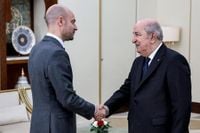On Sunday, April 6, 2025, French Foreign Minister Jean-Noël Barrot embarked on a significant visit to Algiers, aiming to revitalize the strained relations between France and Algeria. This diplomatic mission comes after an eight-month crisis that nearly pushed the two nations to the brink of a complete rupture.
Upon his arrival in the Algerian capital, Barrot engaged in a 1 hour and 45 minute discussion with his counterpart, Ahmed Attaf. Following this meeting, he was scheduled to meet with Algerian President Abdelmadjid Tebboune. The discussions were described as "deep, frank, and constructive," focusing on regional issues and the bilateral relationship, including migration, according to a source from the French diplomatic services.
The backdrop of this visit is a recent phone call on March 31, 2025, between French President Emmanuel Macron and President Tebboune, which reignited the dialogue between the two countries. According to the Algerian government newspaper El Moudjahid, the relationship now appears to be on a "constructive trajectory." Barrot expressed hopes for tangible outcomes regarding security and economic matters during his visit.
The diplomatic crisis between Algeria and France traces back to the summer of 2024 when Macron publicly endorsed a Moroccan autonomy plan for Western Sahara, a territory claimed by the Algeria-backed Polisario Front. This endorsement prompted Algeria to withdraw its ambassador from Paris, marking the beginning of a period of heightened tensions.
Further exacerbating the situation, the autumn of 2024 saw the arrest of Franco-Algerian writer Boualem Sansal in Algeria for statements deemed an attack on the nation’s territorial integrity. The tensions escalated in early 2025 when France requested the expulsion of Algerian influencers, a request that Algeria rejected. The situation reached a boiling point in late February when French Interior Minister Bruno Retailleau blamed Algeria for an attack in France committed by an Algerian national who had been ordered to leave the country but was not accepted back by Algiers.
Despite these provocations, both countries seem to share a renewed desire to restore a balanced and peaceful relationship. Barrot's visit is intended to establish an ambitious work program and create a timeline for implementation. The French Foreign Ministry spokesperson, Christophe Lemoine, emphasized the importance of operational modalities and joint objectives during this diplomatic effort.
While in Algiers, Barrot is also expected to discuss the pressing issue of migration. France has been vocal about its expectations for Algeria to adhere to the 1994 bilateral agreement concerning the acceptance of its expelled nationals. Retailleau has indicated a keen interest in ensuring that Algeria strictly applies this agreement. Currently, the rate of consular passes issued by Algeria is around 40%, a figure that Paris hopes to see improved.
In addition to migration, the discussions will also cover security cooperation, particularly in the fight against terrorism in the Sahel region, where Algeria shares borders with Mali and Niger. The return of jihadists from Syria is another crucial topic on the agenda.
Macron has also taken a personal interest in the case of Boualem Sansal, advocating for a humanitarian resolution for the writer, who is over 80 years old and suffering from cancer. Sansal was sentenced to five years in prison on March 27, 2025, after an interview he gave to a French far-right media outlet was interpreted as undermining Algeria's territorial integrity. Following the conviction, the Algerian prosecutor's office, which had initially sought a ten-year sentence, appealed the ruling, complicating the prospects for a presidential pardon.
The ongoing diplomatic tensions have also led to restrictions on Algerian dignitaries traveling to France, a situation that Paris has sought to address in recent discussions. The two nations are expected to explore a reciprocal visa exemption agreement for diplomatic passports, which could ease some of the strains caused by previous restrictions.
As Barrot's visit unfolds, both sides appear to be cautiously optimistic about the future of their relationship. The French government views the resumption of cooperation between intelligence services as a priority, especially in light of recent security challenges.
For Algeria, the support from France in its negotiations with the European Union regarding a revision of its partnership is viewed as crucial. The two countries are also set to discuss the fate of approximately 6,000 French companies operating in Algeria, highlighting the economic dimensions of their bilateral ties.
In summary, the visit of Jean-Noël Barrot to Algiers represents a pivotal moment for French-Algerian relations. Both nations are eager to move past the recent hostilities and work towards a more cooperative future, focusing on mutual interests in security, migration, and economic stability. As the two countries navigate this complex landscape, the hope is that their renewed dialogue will yield positive results for both sides.





